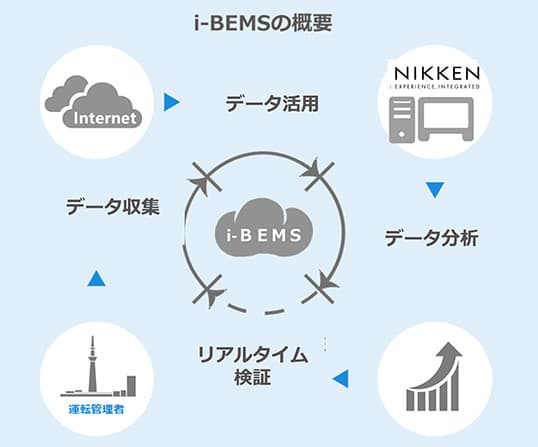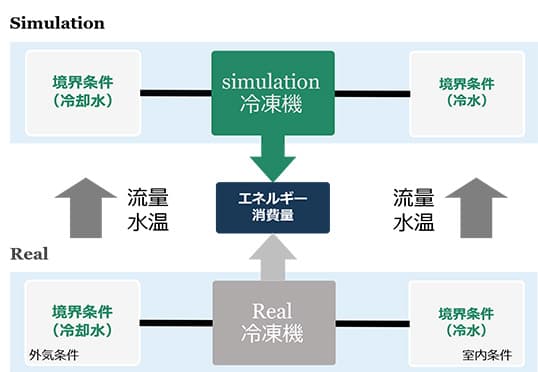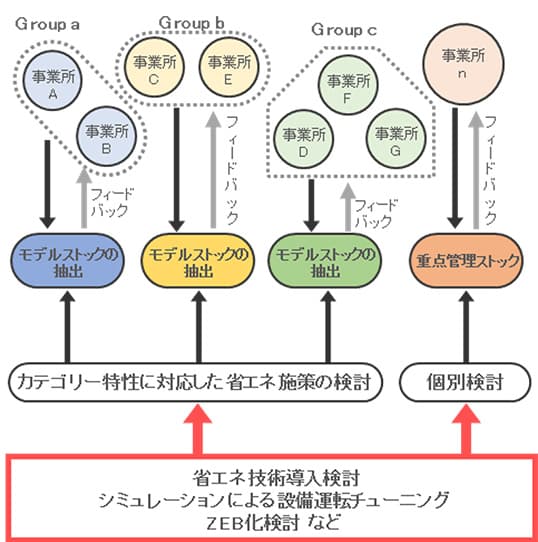
Overview
One of the challenges facing energy resource-poor Japan is its vulnerability to the negative impacts of situations such as soaring energy prices resulting from the global situation. In the Sixth Strategic Energy Plan, the government of Japan has positioned "energy management technology" as an important technology to promote the thorough conservation of energy.
At NSRI, we use simulation technology and knowledge gained from our extensive experience in energy diagnosis to identify wasteful energy consumption in buildings and propose solutions.
At NSRI, we use simulation technology and knowledge gained from our extensive experience in energy diagnosis to identify wasteful energy consumption in buildings and propose solutions.
Features and Approaches
Under our expert knowledge in identifying wasteful energy consumption in various types of buildings, we practice highly effective energy management. Specifically, we provide services that leverage (1) our analytical skills to estimate the amount of energy wasted by estimating suitable energy consumption that takes the building's conditions into account, (2) our insights to identify energy waste through energy consumption trends and various building data, (3) our ability to make energy-saving proposals that suit the particular building, and (4) our experience in examining methods to procure finances. For both new and existing buildings, and for single or multiple buildings as well, from the design phase to the operations phase, through the introduction of subsidy systems and other means, we support our clients in finding solutions to the various difficulties they face.
Service Details 1
Support for life cycle energy management of new buildings

To thoroughly conserve energy in new buildings, it would be necessary to manage the energy performance of a building throughout its life cycle, from design to operations. Under given design conditions, a building's energy consumption targets are set, feasibility is confirmed in stages through simulations based on the design and construction situation, and the achievement of targets is verified through actual figures in the operations phase. These are generally performed through a process known as commissioning. We support this process through the formation of a team centering on experts who are qualified commissioning professional engineers (Cx-PE).
Service Details 2
Support for energy management of existing buildings

Wasteful energy consumption is often noted in existing buildings due to aging equipment, operations that differ from the design intent, and other various factors. Based on information such as building and equipment specifications, energy consumption, BEMS, and facts gathered through interviews on building operations, we draft a hypothesis on wasteful use of energy, which is then verified through clear evidence. We propose solutions to the issues that have been brought to light and conduct simulations to quantify the amount of improvement. We can also propose the use of various subsidy systems.
Service Details 3
Support for energy management of multiple buildings

Clients owning multiple buildings are most likely to encounter many difficulties such as deciding how to prioritize buildings for energy-saving upgrades, as well as budget planning. Based on building use, size, year of completion, building and equipment specifications, renovation history, and questionnaires regarding matters such as building operations, as well as actual figures on energy consumption, we organize buildings by priority for energy-saving upgrades. And for buildings deemed high priority, energy conservation methods that should be adopted are organized based on a cost-benefit analysis.
Service Details 4
Energy management of district heating facilities
Expectations are held on district heating facilities for their benefits of economy of scale in the use of unused heat and heat recovery at the community level by aggregating consumer buildings' heat demand, and the realization of energy savings in the entire area supplied by district heating through more efficient heat-source equipment. On the other hand, an important challenge in terms of business profitability is reducing the utility costs of district heating facilities responding to heat demand. Through analyses of the energy performance of many district heating facilities and approaches such as simulations, we support efforts to conserve energy through improved operations and equipment upgrades.
Other support
To achieve Japan's decarbonization goals, the national government is placing importance on improving the energy performance of buildings and district heating facilities. We believe that achieving a reduction of energy consumption that would serve as a model will not only improve business profitability by reducing utility costs, but by applying to competitions and demonstrating these achievements to the world, will also contribute to enhancing the added value of the company. We will provide support that is based on our extensive experience in receiving awards.